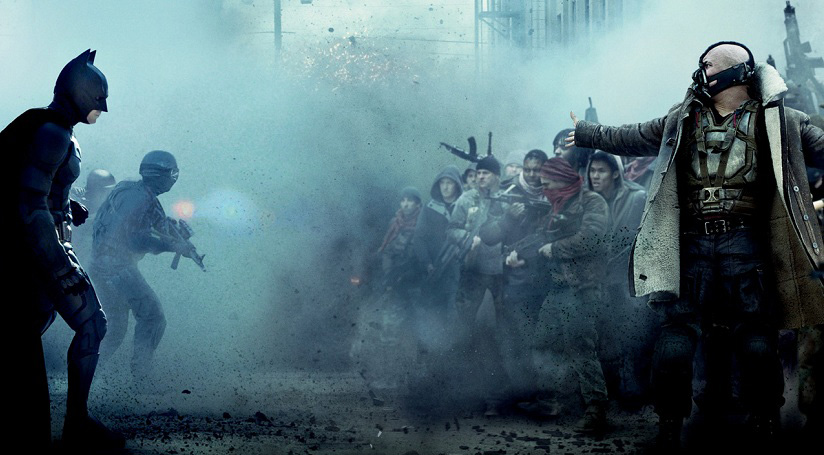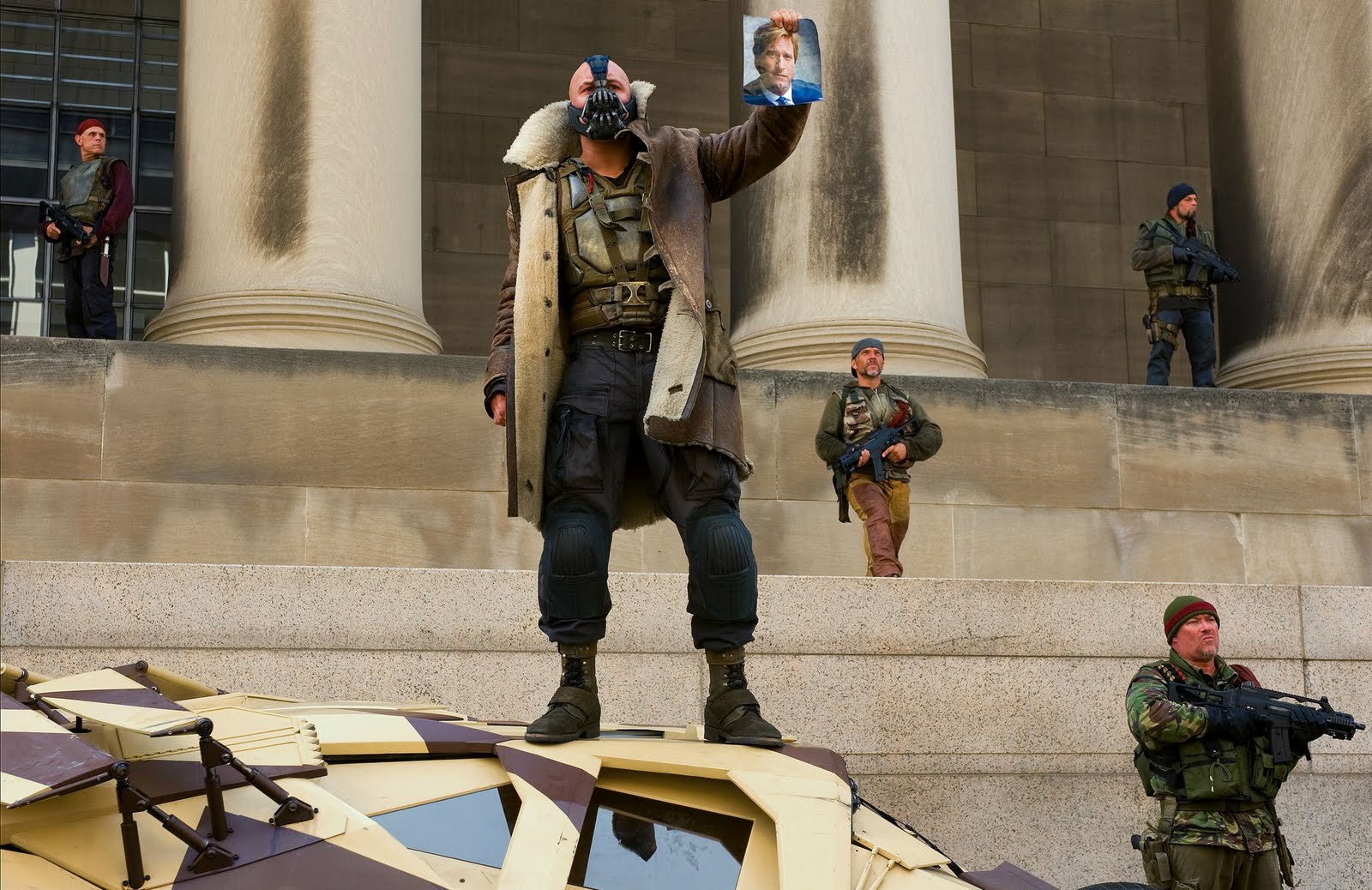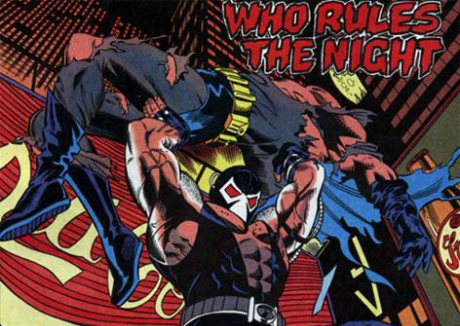IN DEPTH: What 'The Dark Knight Rises' Could Have Been
An enterprising Reddit user recently posted a thread that highlighted 120 films – one from each year from 1894 to 2014 – that had the most “9” or “10” user scores, and the winner from 2012 was The Dark Knight Rises. This bothers me for a variety of reasons, mostly stemming from the fact that the film just isn’t that good.
Results from the list and further use of statistics confirmed two things that I’ve believed for quite some time. First, users are prone to give out higher scores than before. I imagine the sheer volume of individual scores (1908’s Ben Hur, for example, has only 336 votes compared to Rises’ 754,262) makes a difference, and it’s very much human nature to believe what is new is always better.
Second, the sheer amount of “fanboydom” really skews everything. Too many people are ready to give any film from Christopher Nolan or Joss Whedon a glowing review. I admit that I thought quite highly of Rises the first time I saw it, but the film becomes weaker with each subsequent viewing. There is no way that Rises was the best film in 2012. Argo, Silver Linings Playbook, The Master, Monsieur Lazhar and a host of other films were much stronger. They simply lacked the spectacle of Rises and the built-in audience comic book blockbusters possess.
But Rises is a decent film. It’s not great and it’s by far the weakest installment in what turned out to be a rather disjointed trilogy, with The Dark Knight serving as a standalone film. Nolan said he never meant for his Batman films to be considered a trilogy. But since there are three films, and the third was billed as the “conclusion” during its promotional run, it will be judged as a sequel, with plot points and character arcs that need necessary nods to its two predecessors.
Heath Ledger’s untimely death may or may not have played in the general direction of the story and Nolan’s interpretation of Batman. (My guess is it did, if you care to know). Of course, going on at length about what Ledger’s Joker could’ve brought to the third film would be needless and rather grim, though it’s certainly worth some discussion. There were plenty of other parts of the film I felt dissatisfied with, or at the very least, would’ve liked to see go in another direction.
It’s unfortunate Two-Face’s story arc lasted just half a film.
Two-Face was one of the trilogy’s most compelling characters, having a complete character arc yet receiving the least amount of screen time amongst the trilogy’s villains. He was a fully realized, tragic character, a young idealistic district attorney who loses the battle against corruption and, true to his own words, lived long enough to see himself become the villain.
What made The Dark Knight so brilliant was that it dove headfirst into the psychology of Batman, introducing two villains that were reflections of his psyche. The Joker, as Batman’s most formidable villain, explained his raison d’être after their climactic battle, describing their symbiotic relationship as an unstoppable force meeting an immovable object, and that their epic battles will never end because they’re simply “too much fun” for the Joker. Harvey Dent/Two-Face clearly represented Batman’s struggle to reconcile the two sides of his double identity. The problem is that Two-Face’s story was wrapped up far too quickly and neatly.
In Rises, the villains are generic iterations of Hollywood villains, with Bane being the super smart, super strong criminal and Catwoman as the traditional femme fatale. Neither are psychologically compelling characters. Although Dent doesn’t appear in the third film except for a few obligatory split-second flashbacks, the events that occur in the third film are direct results of the Two-Face’s death. It’s glossed over in Commission Gordon’s inauspicious opening speech, but the Dent Act serves as a passive yet interesting parallel to Batman.
Both the Dent Act and Batman are unforgiving (and sometimes poor) judges of moral righteousness. Batman doesn’t kill, but he is relentless in dishing out his own form of justice and often justifies his actions by claiming it’s for the greater good. The Dent Act is similar – Gotham is turned into a police state and citizens are imprisoned without being given proper trials or the right to appeal, to expedite the battle against corruption and clean up the city. Despite their similarities, the Dent Act gets a whimpering mention from Gordon and gets abandoned midway throughout the lengthy film. The film then quickly devolves into just another run-of-the-mill tale of a hero overcoming significant odds to defeat the villain(s) and save the city.
It’s unfortunate the Joker didn’t make a return.
Heath Ledger died before production for Rises began, so there’s no way of knowing whether or not he would’ve been a part of the third film. But, the Joker played such a big role in defining Batman it’s difficult to imagine a conclusion without a final confrontation between them.
According to numerous interviews, Nolan’s Batman series was originally meant to be just two films, with Batman becoming a lifelong fugitive at the end of The Dark Knight, destined to battle the Joker forever. When Rises was given the green light, the assumption was that Ledger would return as the Joker, partly because he was too good to not return. Ledger’s presence alone would’ve raised the profile of the third film, and it would be interesting to see him tackle the challenge of topping such a frightening original performance with the same character.
But if Ledger returned, what role would he have played? The most sadistic, violent and sociopathic Joker to ever appear on the big screen gave Nolan and Ledger plenty of leeway to take the character in new directions. It would’ve been interesting to see how they would end Batman and Joker’s war, since it’s been established they’re destined to never stop fighting each other.
A trio of Bane, Catwoman and the Joker would’ve made for some interesting scenarios. If Bane wanted to kill Batman, would the Joker subvert Bane’s plans just to keep Batman for himself? What would a conversation between Bane and the Joker be like? Would Bane see the Joker as a nuisance and attempt to kill him? Would the Joker have let Bane destroy Gotham? It’d be another interesting dynamic to pit Bane’s meticulous planning against Joker’s “agent of chaos.”
In my own little make-believe world, Bane deduces Batman’s identity, storms Wayne Tower and kills Lucius Fox in an attempt to destroy everything Bruce Wayne cares about. Batman then reluctantly accepts the Joker’s offer to help stop Bane from destroying Gotham, and convinces Catwoman to join forces with them because the trio realizes that they need a playground for their antics, and ultimately Gotham is still their turf. Of course, in typical Joker fashion, he double-crosses Batman in the end because “with the Joker, it’s never that simple.”
Keep Reading This Post...
It’s unfortunate that after an intense buildup, Bane was a mere mercenary after all.
It’s a shame that Rises spends the entire film building up Bane to be a super villain only to give him a really anticlimactic death, and the final reveal of Marion Cotillard (swoon) as Talia al Ghul reduces Bane to a mere goon.
In the comics, Bane was simply a highly intelligent and physically imposing villain, a physical and mental match for Batman, but certainly not a psychological extension like the Joker or Two-Face. It was clear Nolan spent a lot of time re-interpreting and establishing Bane as more than just a mercenary, but in the end he still was revealed to be a mere pawn (and love interest?!) for Talia. I mean, at one point, Bane even starts crying when Talia starts telling their story. The soul crushing, bat breaking super villain cries! I don’t even… and as big of a deal Bane and Talia’s story seems to be, they don’t share a significant scene with each other. For such an exposition-heavy film, you’d think they’d be able to fit one in.
Presumably, Bane is willing to get blown up with Gotham more than just because he’s a hired gun. Whether he makes the ultimate sacrifice for the League of Shadows, or Talia or just because he’s tired of wearing that damn mask (must be difficult to eat) is never resolved. And then out of nowhere Catwoman shows up in the Batpod and just simply blows Bane away with a cannon, inevitably saying some snarky line about how Batman kind of likes making his life miserable (it’s true). To be honest, it felt kind of lazy.
Meanwhile, Bale and Cotillard’s seemingly indomitable combined sex appeal really fails to register on any level, and instead feels like an awkwardly-placed love scene in a James Bond film. And there’s that weird, half-moon scar that Bruce explicitly points out to the audience on Talia’s back that I take to be some sort of League of Shadows symbol, which he simply ignores. And, honestly, what’s the one rule every athlete knows not to break the night before the big showdown? Abstain from sex!* Rookie mistake.
I would’ve liked to see Batman fight smart in the final battle and outwit Bane in their final confrontation (I always imagined it to be like the rope-a-dope match in Ali vs. Foreman), leading Bane into an inescapable trap and leaving him there to die as Batman did with Ra’s al Ghul. Wouldn’t that have been a more perfect way of really wrapping up the League of Shadows storyline and have Batman truly remain an incorruptible force? Or something along those lines.
*let the debate begin – did Talia al Ghul sleep with Bruce Wayne to tire him out before the wonderful sewer fight against Bane?
It’s unfortunate they had the worst comic book reference in the world.
In my humble opinion, either you follow the comic or you don’t. The worse that can happen is to sit on the fence, because the end result is usually a character that doesn’t seem to fit neither here nor there. John Blake is that character.
While I like the idea of having a different man wear the cape and cowl to propagate the idea of an eternal Batman, the reference to Batman’s sidekick felt so forced. It was cringe-worthy. Bale famously said he wouldn’t do a Batman film if Robin was part of it, and everyone believed him because a) no one pisses of Christian Bale, and b) it just wouldn’t be quite like Nolan to introduce the Boy Wonder, because his films tend to feature more middle-aged male characters.
The film’s plot closely echoes the story from the “Knightfall” comic, but in the original story, Batman’s mantle is temporarily taken up by the hyper-violent and morally ambiguous Jean-Paul Valley. Why not just use him? Only those familiar with Batman lore would recognize that name. It would’ve been interesting to have Jean-Paul take up Batman’s mantle full-time to end the film, and leave comic book fans with the knowledge that Bruce Wayne will eventually have to return. Internet forums would crash and Batman 4 would’ve been inevitable.
If Nolan was so intent on including a reference to Robin, why not just name the officer Dick Grayson, but leave his name unrevealed until the final act? Or if they want to go the same gimmicky route, why not introduce him as Richard Grayson but have all the other cops call him “dick” because he’s Boy Scout with an authority problem? I get that Blake might be Nightwing instead of Robin, because it would just be too obvious if Robin was Robin. There’s a tough for one for the commissioner.
The character itself was poorly developed, too. I’ll accept the notion that an orphan can intuit Bruce Wayne as Batman when nobody else in the world can (eye roll). But to explain Blake’s distaste for guns because of a ricochet bullet that accidentally kills a potential witness was absolutely silly. I mean, Blake’s a cop and he pulled out a damn gun! What did he think was going to happen?!
How I rate Rises really depends on my mood. That’s debatable for quite a few films, but for the one that garnered the most 9 and 10 scores on IMDb, it is definitely, definitelynot a film that is enjoyable every single time.
The Dark Knight Rises is a highly enjoyable film, but there are other holes that prevent it from reaching the heights of the second, which had faults of its own. For a Batman film that has a clear beginning, middle and end, Batman Begins is the strongest entry in the series, though The Dark Knight takes the cake for sheer scale. There are just too many things that distract Rises from being great, not to mention Ledger’s untimely death will always leave audiences with the ultimate “what if.”
For the best Batman fight scene ever and Tom Hardy and Anne Hathaway, the film gets a score of 3 stars out of 4.
The film certainly takes place on a larger scale, but bigger and louder don’t necessarily mean better.
(Let’s hope X-Men: Days of Future Past doesn’t fall into this trap.)
About the Author:
Jason Chen is a Canadian writer. You can find his sports-focused work on Rotowire and Hockey’s Future. More of his articles on movies can be found here. He’s also been known to tweet (sometimes a lot).






